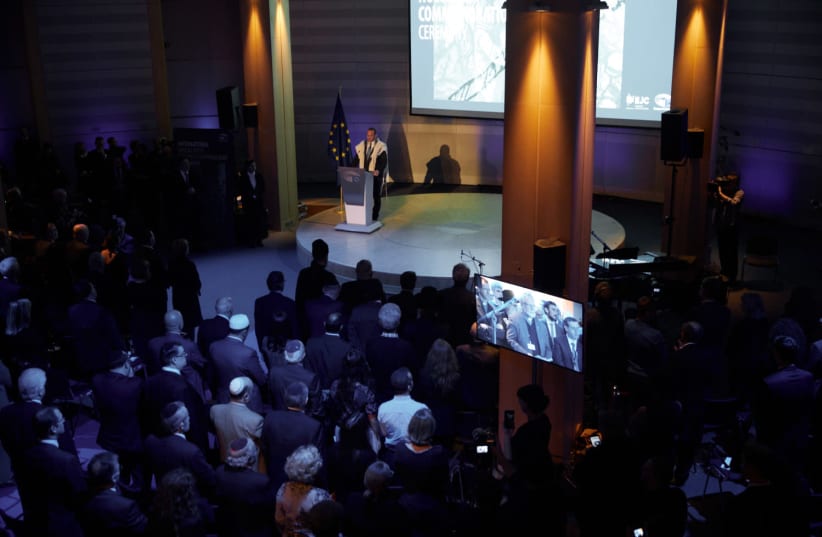Both Kantor and Knesset Speaker Yuli Edelstein, who also spoke at the event, made note of antisemitic incidents that occurred in Europe in the past year.“Because of the constant threat, synagogues and Jewish community centers in many European countries have been put under massive, 24-hour police protection,” Kantor said. “Less than a month ago, synagogues in Malmo and Gothenburg were firebombed because of the absurd belief that European Jews are to be blamed for a diplomatic statement from a leader, thousands of miles away, describing the self-evident truth that Jerusalem is the capital of Israel. Attacks on Jewish individuals and institutions cannot be justified and are unacceptable in any context.”Stressing that the European Union must put more measures in place to fight antisemitism, he concluded that “the lessons of the Shoah should have a strong and decisive follow-up.”For his part, Edelstein delivered a message similar to the one he conveyed to the Belgian Parliament the day before: that for all the good work that had been done to commemorate the Holocaust, much is left to be done.“Ladies and gentlemen, Let me draw your attention to the following events that took place in a single year: The Jews in Bochum, Germany, felt compelled to hide their identities, for fear of attack. In Gothenburg, Sweden, a synagogue was firebombed. In Vienna, London and Berlin, rallies called for death to the Jews. This was not in 1933.These were headlines from the last year – 2017,” Edelstein emphasized. “Seven years ago, I stood here and asked, ‘What have we learned?’ Today, following these 2017 events, I ask you once again, ‘What have we learned?’” First Vice President of the European Parliament Mairead McGuinness told the audience: “Dedicating one day of the year to commemorating the Holocaust is also about the future and the role of future generations.“We need to teach the future generation about the Holocaust so it could never happen again.... The notion of ‘never again’ is deeply ingrained in the psyche of the EU,” she said. “Seven decades after the Holocaust, we have few survivors left with us. This is now the duty of the new generation to keep the memory of the victims alive.”Holocaust survivor Tomás Radil shared with the audience his experience of living through Auschwitz, recounting how he survived the “selections” of the notorious SS physician Josef Mengele, also known as the “Angel of Death.”“We approached Mengele, we behaved in a German military way and showed we were just eager to serve the German Reich, and that’s why I’m here today,” he recounted.He also recalled “a day in July when more than 300 Roma were killed in a single night and nobody remained alive.”Radil remarked that only 74 years have passed since the Holocaust.“From a historical point of view, that’s nothing. Mass killing, genocide, is still a very possible solution to some problems. That is my warning,” he concluded.The writer was a guest of the European Jewish Congress.International Holocaust Commemoration event @Europarl_DE @eurojewcong pic.twitter.com/uKvYXzCXri
— Tamara Zieve (@TZieve) January 24, 2018
EU Parliament Holocaust event remembers Roma victims for 1st time
The main ceremony, held on Wednesday afternoon, was preceded by the launch of a new exhibition about the Roma and Sinti victims of the Nazis.
